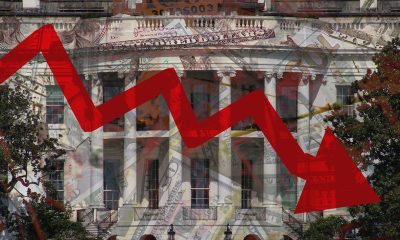Activism
“Two things can be true at once.” An Afro-Latina Voter Weighs in on Identity and Politics
“As a Puerto Rican I do not feel spoken to in discussions about Latino voters… which is ironic because we are one of the few Latino communities who are also simultaneously American,” Ortiz-Cedeño says. Puerto Ricans born in Puerto Rico, a U.S. territory, have American citizenship by birth but they do not have the right to vote for president if they live on the island. “I think that we miss out on a really interesting opportunity to have a nuanced conversation by ignoring this huge Latino population that is indigenously American.”
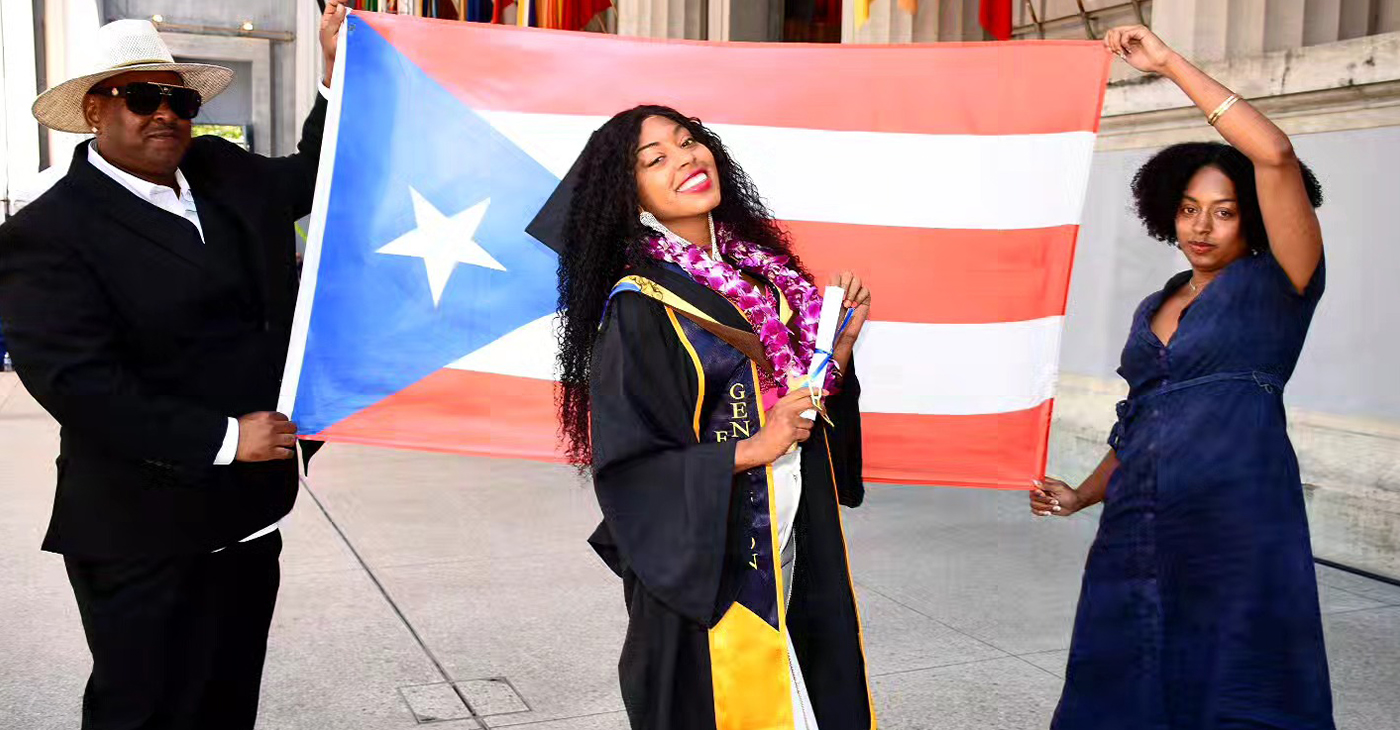
By Magaly Muñoz
On a sunny afternoon at Los Cilantros Restaurant in Berkeley, California, Keyanna Ortiz-Cedeño, a 27-year-old Afro-Latina with tight curly hair and deep brown skin, stares down at her carne asada tacos, “I’ve definitely eaten more tortillas than plantains over the course of my life,” says Cedeño, who spent her childhood in South Texas, among predominantly Mexican-American Latinos. As she eats, she reflects on the views that American politicians have of Latino voters.
“As a Puerto Rican I do not feel spoken to in discussions about Latino voters… which is ironic because we are one of the few Latino communities who are also simultaneously American,” Ortiz-Cedeño says. Puerto Ricans born in Puerto Rico, a U.S. territory, have American citizenship by birth but they do not have the right to vote for president if they live on the island. “I think that we miss out on a really interesting opportunity to have a nuanced conversation by ignoring this huge Latino population that is indigenously American.”
Ortiz-Cedeño, an urban planner who is focused on disaster resilience, homelessness and economic prosperity for people of color, says that political conversations around Latinos tend to shift towards immigration, “I think this ties back into the ways that our perception of ‘Latino’ tends to be Mexican and Central American because so much of our conversation about Latinos is deeply rooted in what’s happening on the border,” she says. “I don’t think that the Afro-Latino vote is frequently considered when we’re talking about the Latino vote in the United States.”
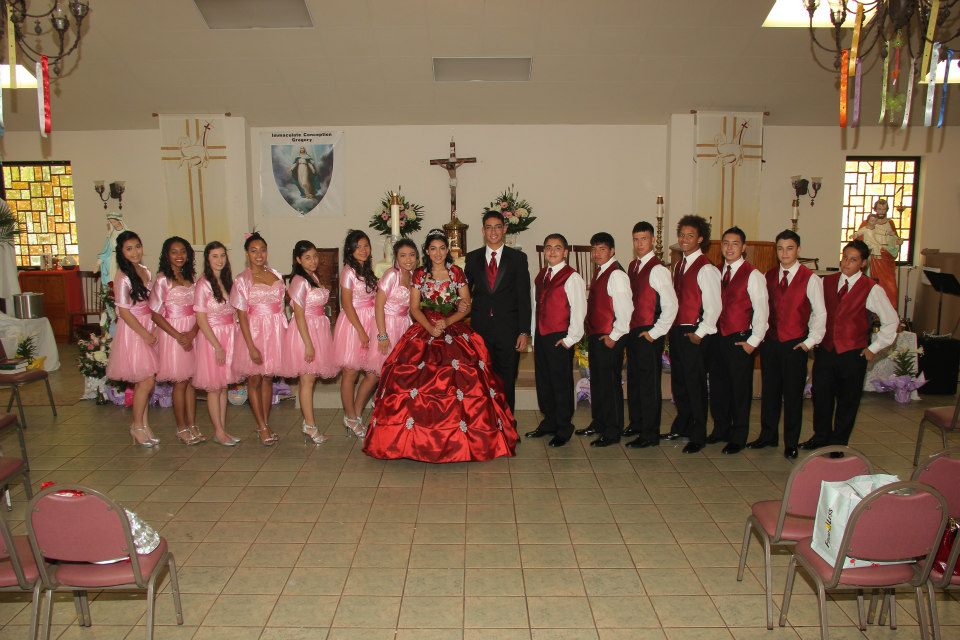
Primarily surrounded by Mexican-Americans while growing up in South Texas, Keyanna participated in many Chicano cultured events, such as being a dama in several quinceñeras. Courtesy photo.
As Ortiz-Cedeño sifts through childhood photos of her as a happy teen dancing with the Mexican ballet folklorico group in high school and as a dama in quinceñeras, she reflects on growing up in South Texas, an area with a large population of white and Mexican-Americans. The Black population was small, and within it, the Afro-Latino population was practically nonexistent.
“It was interesting to try to have conversations with other Latinos in the community because I think that there was a combination of both willful ignorance and a sort of ill intent and effort to try and deny my experience as a Latino,” she says. “There are a lot of folks in Latin America who experience a lot of cognitive dissonance when they think about the existence of Black Latinos in Latin America.
Ortiz-Cedeño comments on the long history of anti-Blackness in Latin America. “Throughout Latin America, we have a really insidious history with erasing Blackness and I think that that has been carried into the Latino American culture and experience,” she says. “People will tell you, race doesn’t exist in Latin America, like we’re all Dominicans, we’re all Puerto Ricans, we’re all Cubans, we’re all Mexicans. If you were to go to the spaces with where people are from and look at who is experiencing the most acute violence, the most acute poverty, the most acute political oppression and marginalization, those people are usually darker. And that’s not by accident, it’s by design.”
Because of the lack of diversity in her Gulf Coast town, as a teenager, despite being the only Spanish-speaker at her job in Walmart, Latinos refused to ask for her help in Spanish.
“Even if monolingual [Spanish-speaking] people would have to speak with me, then they were trying to speak English, even though they could not speak English, versus engaging with me as a Latina,” she says.
“I think that the perception of Latinos in the United States is of a light brown person with long, wavy or straight hair. The perfect amount of curves and the perfect combination of Indigenous and white genes. And very rarely will people also consider that maybe they also have a sprinkle of Blackness in them as well,” she says. “Over 90% of the slave trade went to the Caribbean and Latin America.”
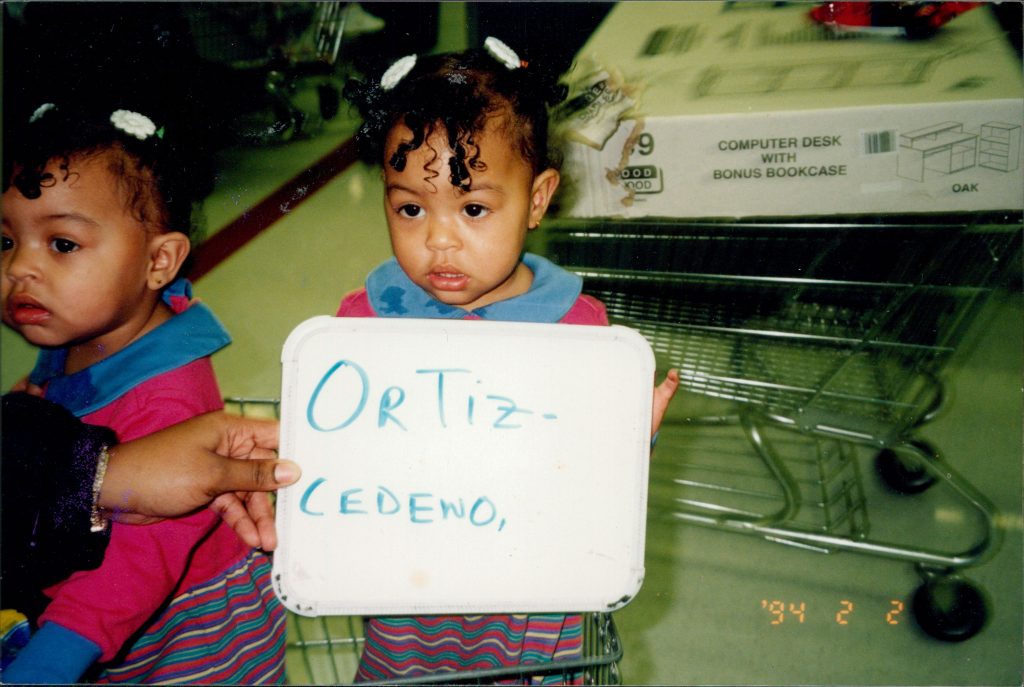
Keyanna as a toddler, holding a whiteboard up with her last name, Ortiz-Cedeño, on it. Courtesy photo.
Ortiz-Cedeño remembers when a Cuban family moved in next door to her in Texas. The teen daughter had blue-eyes, blonde hair and only spoke Spanish, which caused neighboring Latinos to take pause because she didn’t fit the Latino “look” they were used to.
“People didn’t have an option to try and negate her [Latino] identity because they had to acknowledge her for everything that she was,” Ortiz-Cedeño says.
Later on, the girl’s cousins, a Black, Spanish-speaking Cuban family, came into town and again locals were forced to reckon with the fact that not all Latinos fit a certain criteria.
“I think it forced everybody to have to confront a reality that they knew in the back of their mind but didn’t want to acknowledge at the forefront,” Ortiz-Cedeño says.
Having gone through these experiences as an Afro-Latina, Ortiz-Cedeño says it’s easy for her to understand Kamala Harris’ mixed Indian and Jamaican heritage, “It comes really naturally to accept that she is both Indian and Black. Two things can exist at the same time,” she says. “I had a long term partner for about seven years who was South Indian, from the same state as Kamala Harris, so if we had had a kid, they would look like [Harris],” Ortiz-Cedeño jokingly shares.
She says she can relate to having to walk the road of people only wanting to see Harris as a Black American. The talking point about [Harris] not being Indian or not being Black, just deciding to be Black, is really disingenuous and cheap,” she says.
Ortiz-Cedeño believes that the Harris campaign has not capitalized on the vice president’s mixed identity, which could be vital in bringing together different communities to understand each other on a new level and allow for improvements on America’s racial dynamics.

Keyanna co-managed a recovery center with her mother after Hurricane Harvey. They packed essentials, such as diapers, food, and water for families in need. Courtesy photo.
As she rushes into a Berkeley Urban Planning Commission meeting straight out of Ashby BART station, Ortiz-Cedeño explains her love for talking about all things infrastructure, homelessness, and healthcare access. The topics can be dry for many, she admits, but in the end, she gets to address long-standing systemic issues that often hinder opportunities for growth for people of color.
Having lived through the effects of Hurricane Katrina as a child, with the flooding and mass migration of Louisiana residents into Texas, Ortiz-Cedeño was radicalized into issues of displacement, emergency mitigation, and housing at nine years old.
“I remember my principal had to carry her students on her shoulders and swim us home because so many parents were trying to drive in and get their kids from school [due to] the flooding that was pushing their cars away,” she recalls.
Her family relocated to Houston soon after Katrina, only to be met with a deadly Hurricane Rita. They wound up in a mega-shelter, where Ortiz-Cedeño says she heard survivors stories of the unstable conditions in New Orleans and beyond, which got her wondering about urban planning, a term she wasn’t familiar with at the time.
“I think that when you put people in the context of the things that were happening in this country around [these hurricanes], a lot of us started to really think seriously about who gets to make decisions about the urban environment,” she adds.
Watching the heavy displacement of disaster survivors, hearing stories of her Navy veteran father’s chronic homelessness, and her own mother’s work and activism with homeless communities in the non–profit sector put her on the path to progressive politics and solutions, she says. After attending college on the East Coast- where she says she was finally recognized as a Puerto Rican- and working in housing, economic development, and public policy, she returned to California to earn a Master’s in City Regional Planning from UC Berkeley.
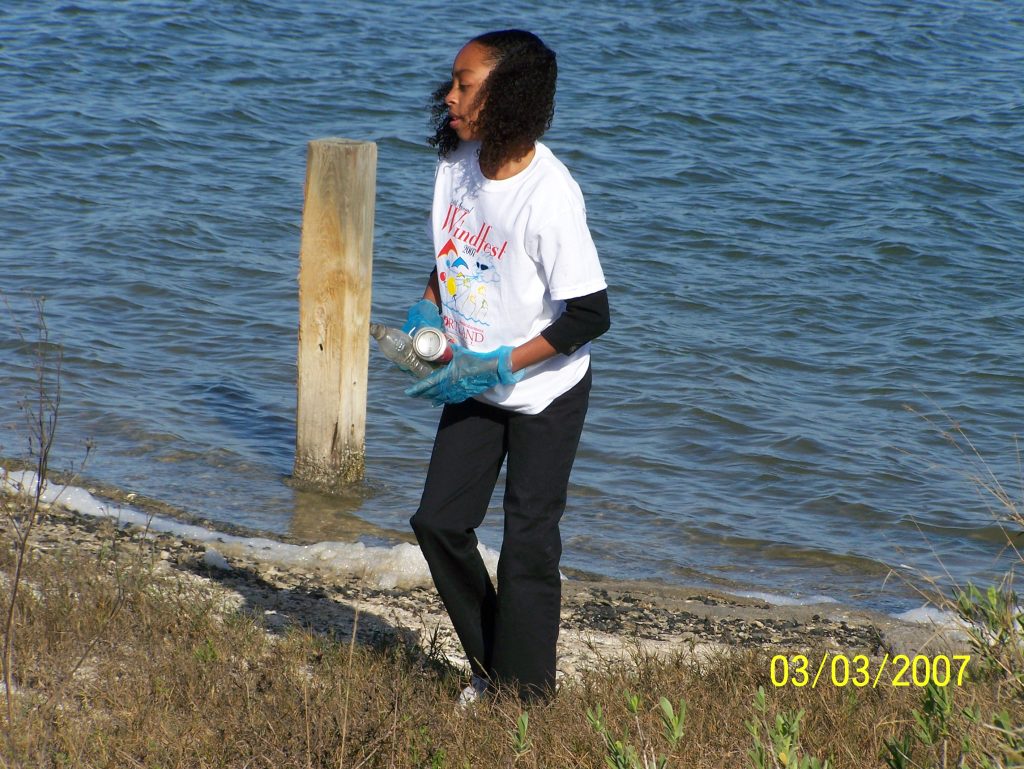
Young Keyanna volunteering at a beach clean up. Activism and giving back to her community has always been a key part of her upbringing. Courtesy photo.
Her vast interest in the urban success of underserved communities even took her abroad to Israel and Palestine when she was an undergraduate college student. “I’ve seen the border with Gaza, I’ve had homestays with farmers in the West Bank,” she says. “For me personally, Palestine is an issue that is really close to the heart.”
“I have a very intimate understanding of the conflict and I’m very disturbed by the way in which the [Democratic] party has not been willing to engage in what I would perceive to be a thoughtful enough conversation about the conflict,” Ortiz-Cedeño says. “The issue of Palestine is going to be one of those that is a make or break issue for her. It has not been one that has been taken seriously enough by the party.”
Ortiz-Cedeño is not under the illusion that one candidate will address every policy issue she wants to see tackled by the president. But she believes it’s better than what former President Donald Trump has to offer.
“Trump has made it very clear what his intentions are with Palestine, and what his relationship is with [Benjamin] Netanyahu,” Ortiz-Cedeño says. “I understand the political strategy that many people are trying to engage in by withholding their vote, but I would also encourage them to re-engage in the political process.”
Casting her vote for Harris is a decision grounded in calculation rather than outright support. “I think I can vote in this election in order to have harm reduction… because I have deep care and concern for other communities that are going to be impacted by a Trump presidency,” Ortiz-Cedeño says.
She also hopes that American politicians will consider the nuance and perspective that Afro-Latinos bring to the table when it comes to politics, policy, and race in America, “When we don’t think expansively about who is Latino in the United States, the breadth of Latino experiences in the United States, we miss an opportunity to capture how diverse Latinos interests are politically.”

This story was reported in collaboration with PBS VOCES: Latino Vote 2024.
Activism
Ann Lowe: The Quiet Genius of American Couture
Lowe was born in Clayton, Alabama, into a family of gifted seamstresses. Her mother and grandmother were well-known dressmakers who created exquisite gowns for women in the area. By the time Lowe was a young girl, she was already showing extraordinary talent — cutting, sewing, and decorating fabric with a skill that far exceeded her age. When her mother died unexpectedly, Lowe – only 16 years old then – took over her mother’s sewing business, completing all the orders herself.
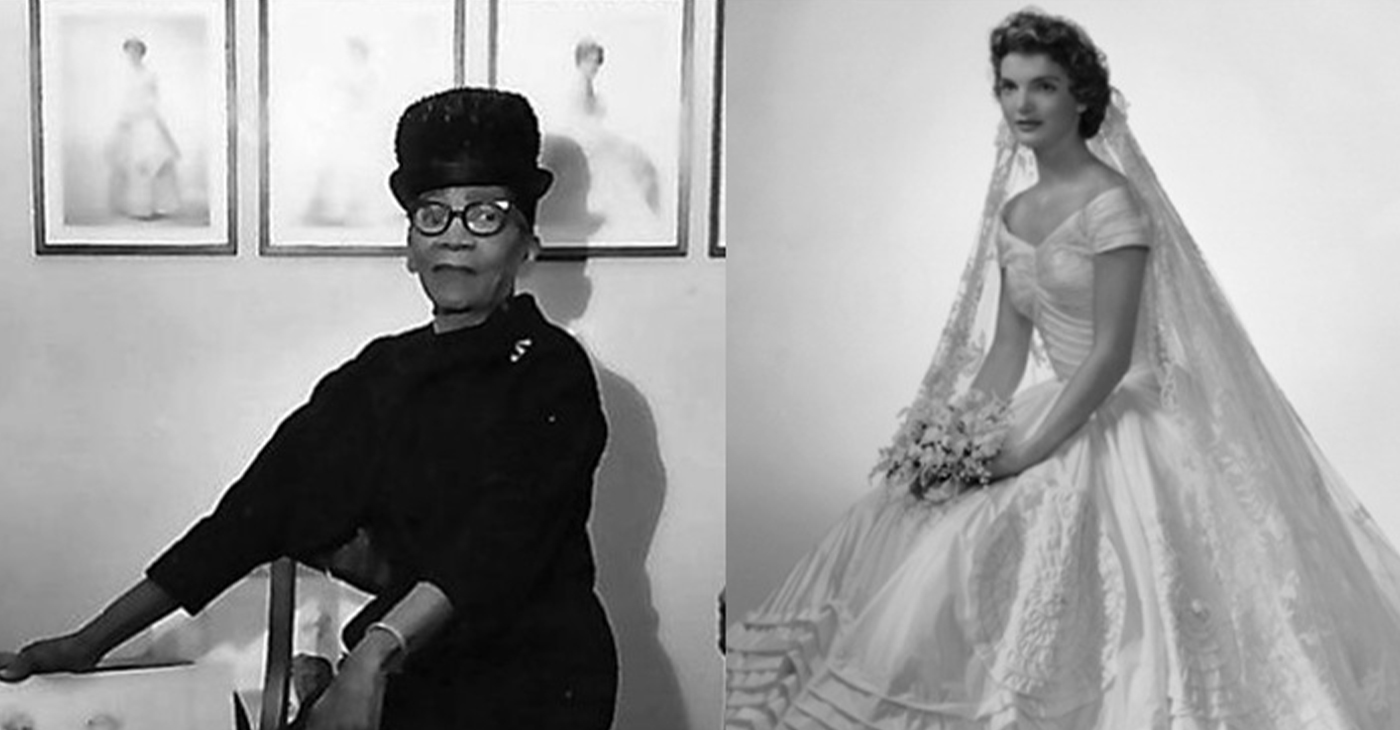
By Tamara Shiloh
Ann Cole Lowe, born Dec.14, 1898, was a pioneering American fashion designer whose extraordinary talent shaped some of the most widely recognized and celebrated gowns in U.S. history.
Although she designed dresses for society’s wealthiest families and created masterpieces worn at historic events, Lowe spent much of her life in the shadows — uncredited, underpaid, yet unmatched in skill. Today, she is celebrated as one of the first nationally recognized African American fashion designers and a true visionary in American couture.
Lowe was born in Clayton, Alabama, into a family of gifted seamstresses. Her mother and grandmother were well-known dressmakers who created exquisite gowns for women in the area. By the time Lowe was a young girl, she was already showing extraordinary talent — cutting, sewing, and decorating fabric with a skill that far exceeded her age. When her mother died unexpectedly, Lowe – only 16 years old then – took over her mother’s sewing business, completing all the orders herself. This early responsibility would prepare her for a lifetime of professional excellence.
In 1917, Lowe moved to New York City to study at the S.T. Taylor Design School. Although she was segregated from White students and forced to work separately, she, of course, excelled, graduating earlier than expected. Her instructors quickly recognized that her abilities were far above the typical student, especially her skill in hand-sewing, applique, and intricate floral embellishment – techniques that would become her signature.
Throughout the 1920s and 1930s, she designed gowns for high-society women in Florida and New York, operating boutiques and working for prestigious department stores. Her reputation for craftsmanship, originality, and elegance grew increasingly. She was known for creating gowns that moved beautifully, featured delicate hand-made flowers, and looked sculpted rather than sewn. Many wealthy clients specifically requested “an Ann Lowe gown” for weddings, balls, and galas.
Her most famous creation came in 1953: the wedding gown worn by Jacqueline Bouvier when she married Massachusetts Sen. John F. Kennedy. The dress – crafted from ivory silk taffeta with dozens of tiny, pleated rosettes – became one of the most photographed bridal gowns in American history. Despite this achievement, Lowe received no public credit at the time. When a flood destroyed her completed gowns 10 days before the wedding, she and her seamstresses worked day and night to remake everything – at her own expense. Her dedication and perfectionism never wavered.
She eventually opened “Ann Lowe Originals,” her own salon on New York’s Madison Avenue. She served clients such as the Rockefellers, DuPonts, Vanderbilts, and actresses like Olivia de Havilland. Yet even with her wealthy clientele, she struggled financially, often undercharging because she wanted every dress to be perfect, even if it meant losing money.
Lowe’s contributions were finally recognized later in life. Today, her exquisite gowns are preserved in museums, including the Smithsonian National Museum of African American History and Culture and the Metropolitan Museum of Art.
In the last five years of her life, Lowe lived with her daughter Ruth in Queens, N.Y. She died at her daughter’s home on Feb. 25, 1981, at the age of 82, after an extended illness.
Activism
2025 in Review: Seven Questions for Black Women’s Think Tank Founder Kellie Todd Griffin
As the president and CEO of the California Black Women’s Collective Empowerment Institute, Griffin is on a mission to shift the narrative and outcomes for Black women and girls. She founded the nation’s first Black Women’s Think Tank, securing $5 million in state funding to fuel policy change.

By Edward Henderson
California Black Media
With more than 25 years of experience spanning public affairs, community engagement, strategy, marketing, and communications, Kellie Todd Griffin is recognized across California as a leader who mobilizes people and policy around issues that matter.
As the president and CEO of the California Black Women’s Collective Empowerment Institute, Griffin is on a mission to shift the narrative and outcomes for Black women and girls. She founded the nation’s first Black Women’s Think Tank, securing $5 million in state funding to fuel policy change.
Griffin spoke with California Black Media (CBM) about her successes and setbacks in 2025 and her hopes for 2026.
Looking back at 2025, what stands out to you as your most important achievement and why?
Our greatest achievement in this year is we got an opportunity to honor the work of 35 Black women throughout California who are trailblazing the way for the next generation of leaders.
How did your leadership, efforts and investments as president and CEO California Black Women’s Collective Empowerment Institute contribute to improving the lives of Black Californians?
We’re training the next leaders. We have been able to train 35 women over a two-year period, and we’re about to start a new cohort of another 30 women. We also have trained over 500 middle and high school girls in leadership, advocacy, and financial literacy.
What frustrated you the most over the last year?
Getting the question, “why.” Why advocate for Black women? Why invest in Black people, Black communities? It’s always constantly having to explain that, although we are aware that there are other populations that are in great need, the quality-of-life indices for Black Californians continue to decrease. Our life expectancies are decreasing. Our unhoused population is increasing. Our health outcomes remain the worst.
We’re not asking anyone to choose one group to prioritize. We are saying, though, in addition to your investments into our immigrant brothers and sisters – or our religious brothers and sisters – we are also asking you to uplift the needs of Black Californians. That way, all of us can move forward together.
What inspired you the most over the last year?
I’ve always been amazed by the joy of Black women in the midst of crisis.
That is really our secret sauce. We don’t let the current state of any issue take our joy from us. It may break us a little bit. We may get tired a little bit. But we find ways to express that – through the arts, through music, through poetry.
What is one lesson you learned in 2025 that will inform your decision-making next year?
Reset. It’s so important not to be sitting still. We have a new administration. We’re seeing data showing that Black women have the largest unemployment rate. We’ve lost so many jobs. We can have rest – we can be restful – but we have to continue the resistance.
In one word, what is the biggest challenge Black Californians faced in 2025?
Motivation.
I choose motivation because of the tiredness. What is going to motivate us to be involved in 2026?
What is the goal you want to achieve most in 2026?
I want to get Black Californians in spaces and places of power and influence – as well as opportunities to thrive economically, socially, and physically.
Activism
BRIDGE Housing President and CEO Ken Lombard Scores Top Honors for Affordable Housing Leadership
The Development Company of the Year honor represents a milestone for BRIDGE Housing, which received the Gold award—its top designation—in a category that included both affordable and market-rate developers. The recognition caps what has been one of the strongest growth periods in the organization’s 42-year history.

By the Oakland Post Staff
San Francisco-based BRIDGE Housing and its president and CEO, Ken Lombard, have been named among the nation’s housing industry standouts, earning two of the top prizes at the 2025 Multi-Housing News Excellence Awards.
BRIDGE Housing was named Development Company of the Year, while Lombard received Executive of the Year, recognition that places the nonprofit affordable housing provider alongside leading national developers of both affordable and market-rate housing.
The awards were announced in New York for the accomplishments achieved during 2024.
Multi-Housing News is one of the industry’s most respected publications. Award winners are selected by a panel of housing professionals, including multifamily developers, architects, and owners.
“BRIDGE Housing is deeply honored to be recognized by Multi-Housing News and our industry peers,” Lombard said. “These awards are a testament to the high-impact, mission-driven work by BRIDGE’s exceptional team to deliver quality affordable housing and support services that empower residents to improve their lives.”
The Development Company of the Year honor represents a milestone for BRIDGE Housing, which received the Gold award—its top designation—in a category that included both affordable and market-rate developers. The recognition caps what has been one of the strongest growth periods in the organization’s 42-year history.
In 2024, BRIDGE significantly expanded its footprint across California, Oregon, and Washington. That momentum continued into 2025, with portfolio growth of 9%, including the addition of nine new communities and 1,187 new or acquired affordable housing units. The nonprofit also added three new projects to its development pipeline as it nears a portfolio of 16,000 units.
The growth reflects a broader strategy aimed at accelerating both acquisitions and ground-up development, supported by partnerships with major financial institutions and innovative capital markets strategies. BRIDGE has also emphasized high-quality design and deep community engagement as central elements of its approach.
BRIDGE became the first affordable housing developer to issue tax-exempt construction bonds for one of the largest affordable housing projects in Portland, Ore., leveraging its strong credit rating.
Earlier this year, the nonprofit launched the BRIDGE Housing Impact Fund, with a goal of investing $1 billion to preserve and create affordable housing. It also closed on $175 million in taxable general-obligation bonds after increasing the offering in response to strong investor demand.
The company’s performance also underscores the role of Lombard, who has led BRIDGE since 2021 and was honored individually for his leadership.
Under Lombard’s tenure, BRIDGE has built a new leadership team with experience drawn from both the nonprofit and private sectors, with a particular focus on what the organization describes as efforts to “break the status quo,” especially in affordable housing finance. Those initiatives have helped reduce capital and construction costs, strengthen relationships with institutional investors, and expand resident support services.
Today, BRIDGE Housing serves more than 33,000 residents across 139 communities on the West Coast.
“Ken has dedicated his career to innovative real estate solutions that improve the quality of life in underserved neighborhoods,” said Kenneth Novack, chair of BRIDGE Housing’s board of directors. “His visionary leadership and the work of our incredible team have positioned BRIDGE for long-term growth that will extend our impact throughout the West Coast.”
Founded in 1983, BRIDGE Housing has helped create more than 23,000 affordable homes with a total development cost of $6 billion.
-

 Activism4 weeks ago
Activism4 weeks agoIN MEMORIAM: William ‘Bill’ Patterson, 94
-

 Activism3 weeks ago
Activism3 weeks agoOakland Post: Week of November 19 – 25, 2025
-

 #NNPA BlackPress3 weeks ago
#NNPA BlackPress3 weeks agoBeyoncé and Jay-Z make rare public appearance with Lewis Hamilton at Las Vegas Grand Prix
-

 #NNPA BlackPress2 weeks ago
#NNPA BlackPress2 weeks agoLIHEAP Funds Released After Weeks of Delay as States and the District Rush to Protect Households from the Cold
-

 #NNPA BlackPress4 weeks ago
#NNPA BlackPress4 weeks agoLewis Hamilton set to start LAST in Saturday Night’s Las Vegas Grand Prix
-

 Alameda County2 weeks ago
Alameda County2 weeks agoSeth Curry Makes Impressive Debut with the Golden State Warriors
-

 Activism3 weeks ago
Activism3 weeks agoOakland Post: Week of November 26 – December 2, 2025
-

 #NNPA BlackPress2 weeks ago
#NNPA BlackPress2 weeks agoSeven Steps to Help Your Child Build Meaningful Connections











